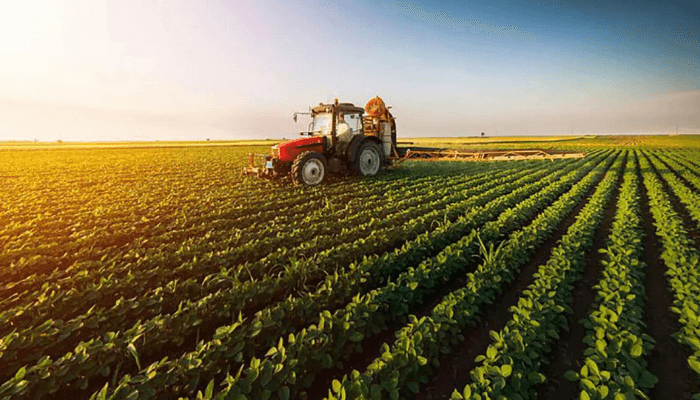
Myriad of Challenges faced by the Agricultural Sector
Nigeria’s agricultural sector has immense potentials for growth and development, but it is still being plagued by myriads of challenges. Gilbert Ekugbe takes a look at how the food sector fared in 2023
Despite contributing 23 per cent of real Gross Domestic Product (GDP) as of December 2023, the agricultural sector recorded an abysmal growth of 1.9 per cent in three quarters of 2023. The sector continued to face mounting challenges as food prices skyrocketed pushing more Nigerians into abject hunger and poverty. Many Nigerians lamented over the high cost of food in the midst of diminishing disposable incomes.
According to a 2023 report by the World Food Programme (WFP), nearly 25 million Nigerians are at high risk of food insecurity between June and August 2023. It also highlighted that 4.4 million people in the North Eastern part of Nigeria are food insecure while 37 per cent of the population lives below the poverty line.
Food inflation
The year was also characterised by food inflation as Nigeria experienced its highest food inflation rate in October, reaching 31.52 per cent. The increase was attributed to rising prices of various food items, including bread, oil and fat, potatoes, yam, fish, fruit, meat, vegetables, and dairy products.
The food inflation is so stern that the United Nations (UN) estimated that 25 million people in Nigeria, or about 15 per cent of the total population, are currently experiencing food insecurity with experts expressing concerns that the situation would worsen if food inflation continues to be on the rise.
Naira scarcity
The naira scarcity significantly impacted the agricultural sector, particularly affecting food production and farmers.
Rural farmers struggled to access cash due to the naira scarcity, which affected their ability to purchase agricultural inputs, pay for transportation, and engage in other farming activities. The scarcity of naira also led to a drop in the production of food, as farmers found it difficult to buy agricultural inputs and maintain their farming activities. Poultry farmers experienced significant losses due to the naira scarcity, as they were unable to sell their products at the desired prices
The naira scarcity worsened the challenges faced by Nigerian farmers even after the aftermath of the 2022 floods and the ongoing insecurity in northern part of the country as a result of the farmers-herders crisis.
The scarcity of naira contributed to food insecurity and has been identified as a key factor in the food crisis in Nigeria, with millions of Nigerians struggling to access food on a daily basis. It also exacerbated an already difficult situation for farmers, leading to significant economic challenges and food insecurity.
Insecurity in food producing states
The level of insecurity in food producing states in the country continued to affect farmers’ productivity and outputs. Insecurity also played a huge part in the decline of investments in Nigeria’s agricultural sector. According to reports, in the second quarter of 2023, investments in the sector fell by 83 per cent to $10 million. Conflicts and insecurity, particularly in the northern part of the country disrupted farming activities and led to displacement which affected food production and distribution.
Many stakeholders in the sector expressed their dismay in Nigeria’s security apparatus, calling on the federal government to upgrade the nation’s security architecture to attract both local and foreign investments into the sector.
Avian Influenza outbreak
During the course of the year, the federal government lamented that Avian Influenza, also known as bird flu, killed about 3.4 million birds across the country and is currently spreading in various poultry nationwide.
The disease caused supply and demand shocks in the poultry industry, leading to a decrease in the production and consumption of chicken and eggs. AI also posed a threat to food security and has had substantial economic implications, with outbreaks and spread causing serious threats to the poultry industry, food security, and livelihoods of people who rely on the poultry sector.
The disease has recurred in Nigeria since 2006, with new strains continuing to appear, and has led to the loss of millions of birds and significant economic costs. Since then, the Nigerian government, in collaboration with the Federal Department of Veterinary Services and the Food and Agriculture Organisation (FAO), has been taking measures to prevent the spread of avian flu which include surveillance and control, training workshops, emergency preparedness and response plan, quarantine measures and depopulation and biosecurity measures.
Federal government’s intervention
The Tinubu-led administration gave a new title to the Ministry of Agriculture and Rural Development as the Ministry of Agriculture and Food Security, following the appointment of a new minister, Senator. Abubakar Kyari, to govern the affairs of the ministry with a vision to achieve a hunger-free Nigeria through an agricultural sector that drives income, accelerates achievement of food and nutritional security, generates employment, and transforms Nigeria into a leading player in global food markets.
The ministry has been implementing various projects and platforms to support agriculture and rural communities in Nigeria, including the Agriculture Promotion Policy, the APPEALS Project, and the Livelihood Improvement Family Enterprise (LIFE) programme. So far, the ministry has also been distributing certified seeds to smallholder farmers in different states to improve their productivity and income, reaffirming its commitment to growing Nigeria’s agricultural sector and achieving food security in the country.
On assumption of office, Kyari vowed to tackle hunger and expressed his willingness to commit fully to the service of the nation by solving the challenges of the agricultural sector.
Kyari has unveiled several plans to transform the agricultural sector in the country. Some of these plans include data-driven decision-making, stakeholder mapping, reviewing existing projects, tractor production and increased private sector engagements.
According to recent projections, Nigeria is expected to see about 26.5 million people grappling with high levels of food insecurity in 2024. Additionally, approximately 9 million children are at risk of suffering from acute malnutrition or wasting, with 2.6 million children facing Severe Acute Malnutrition (SAM) and requiring critical care. Several factors are driving this trend, including ongoing conflicts, climate change impacts, escalating inflation, and rising costs of both food and essential non-food commodities. Persistent violence in the North-eastern states of Borno, Adamawa, and Yobe hinders food availability and access.
Just recently, the FAO predicted that food crises will continue to dominate the global outlook for 2024.
According to the United Nations’ food body, further funding squeezes are expected, while extreme weather events driven by the climate crisis, intensifying conflicts and economic instability would push more people into hunger.







